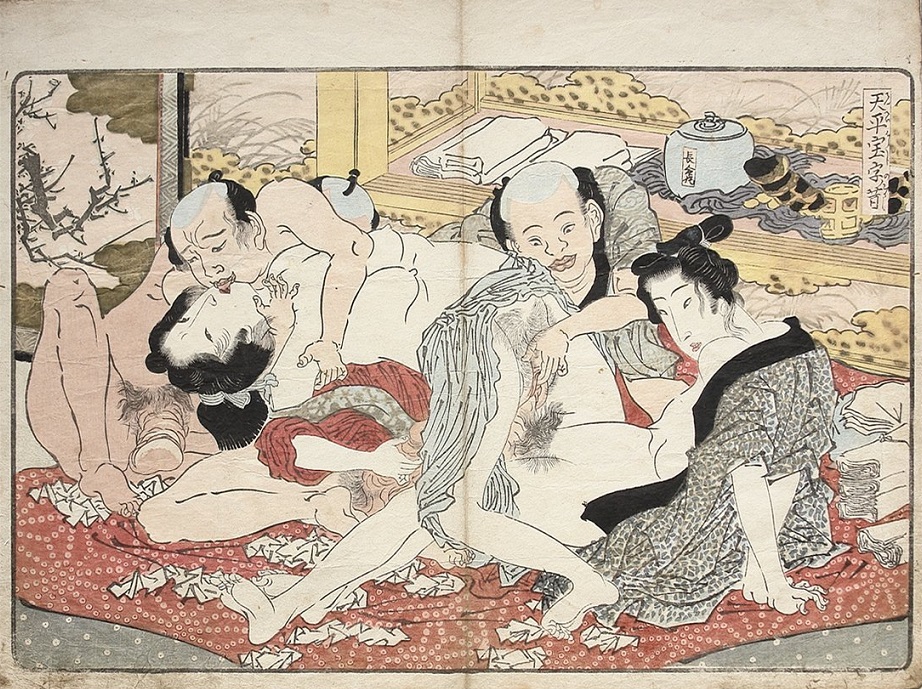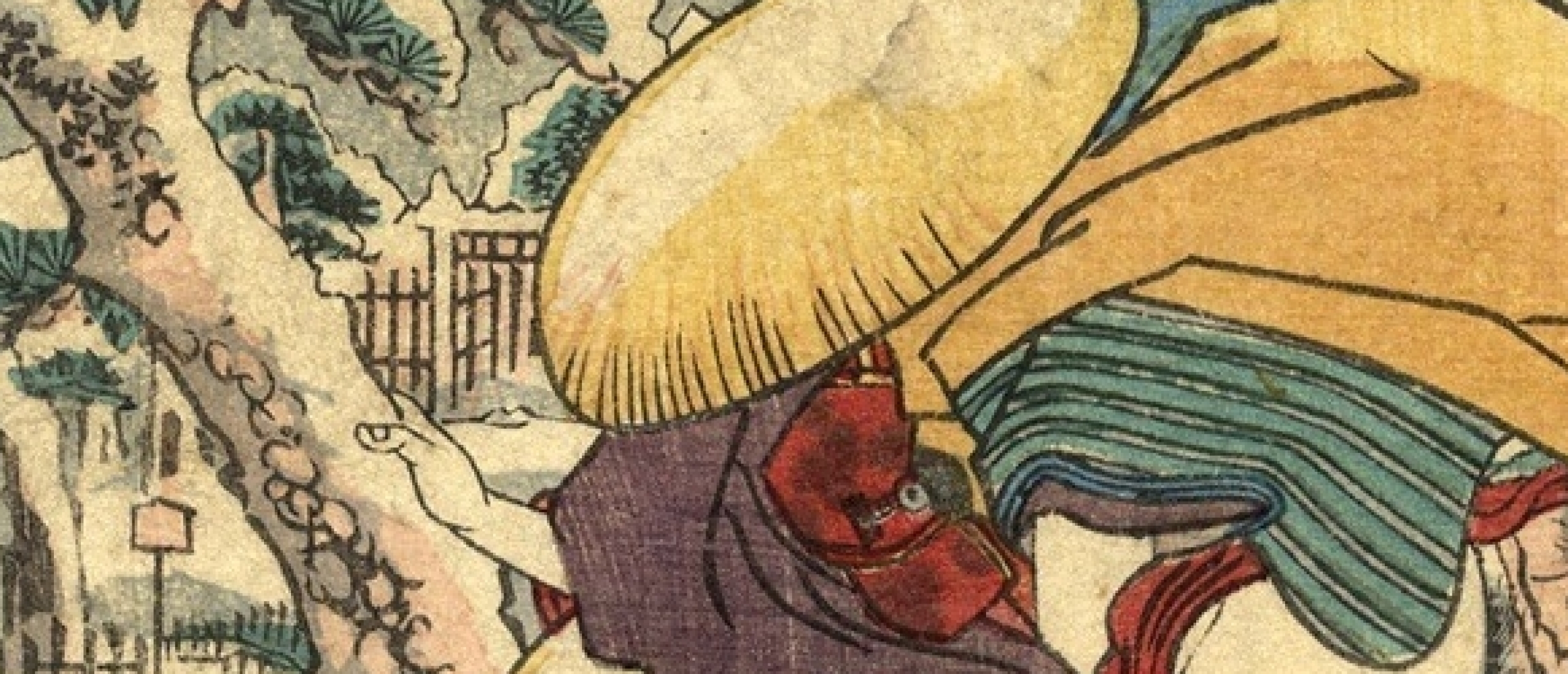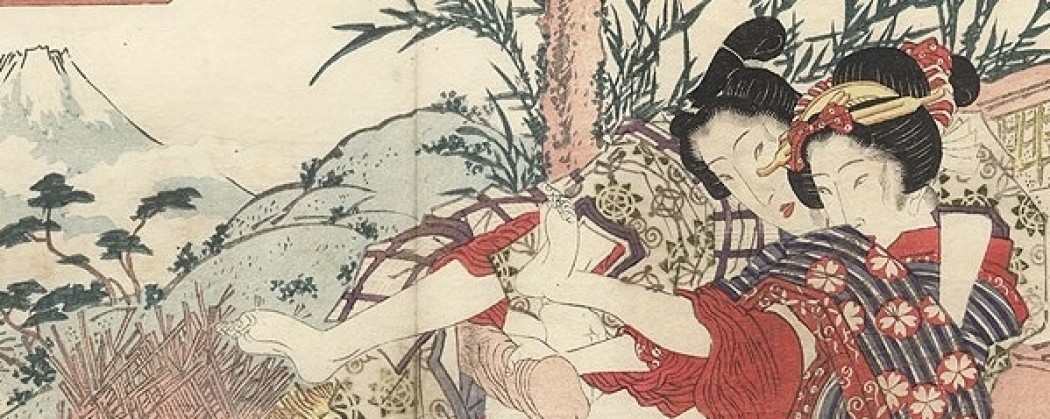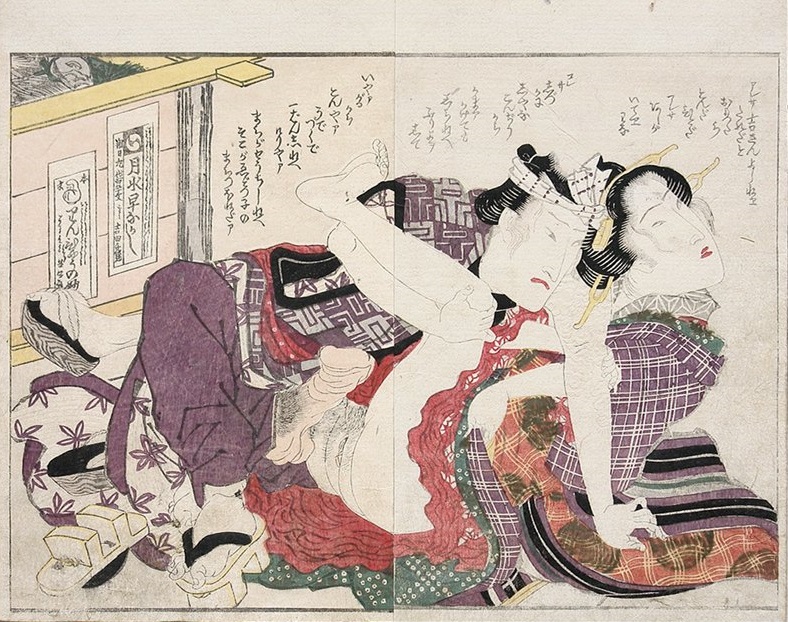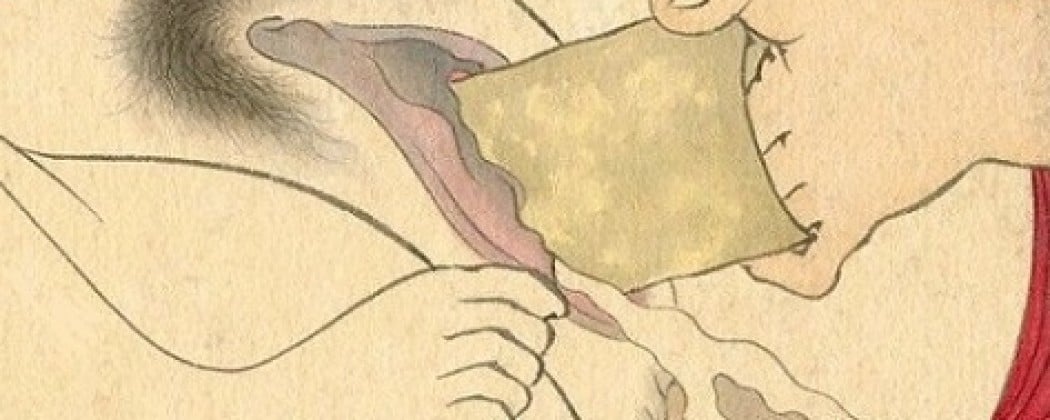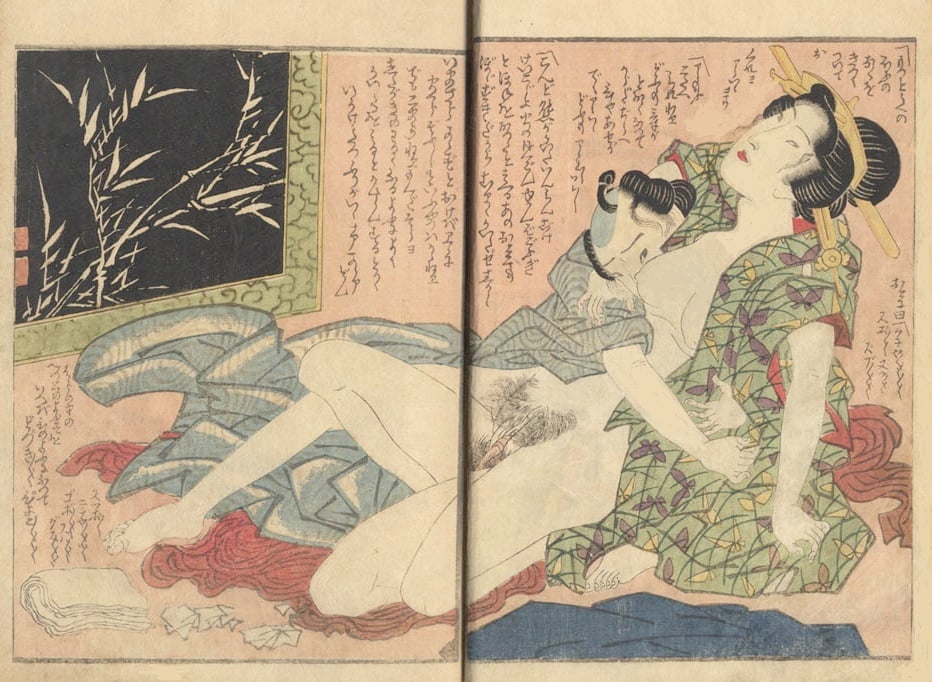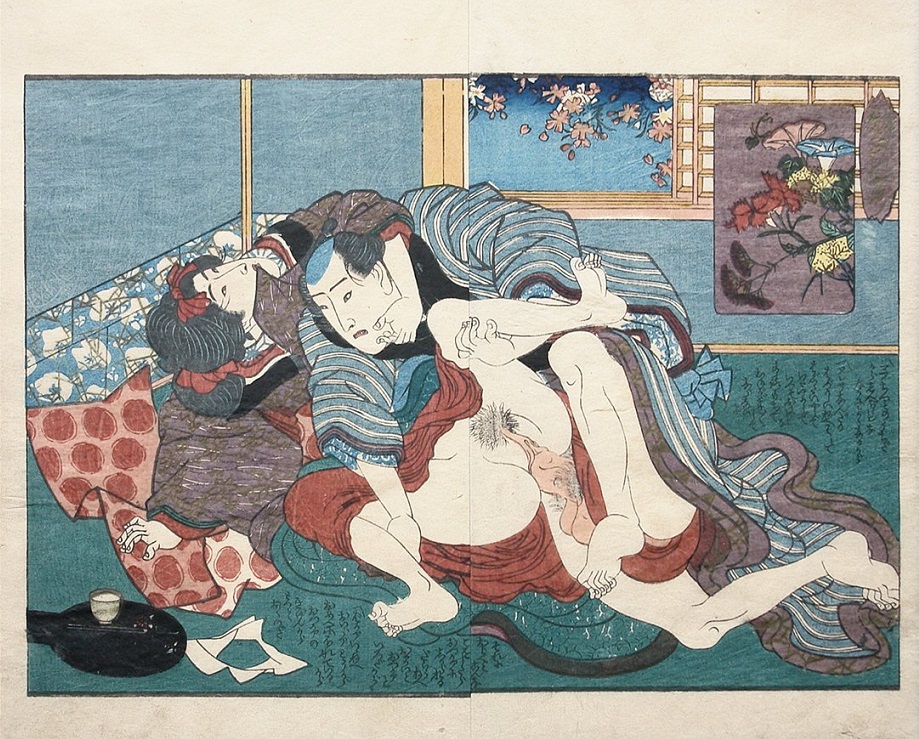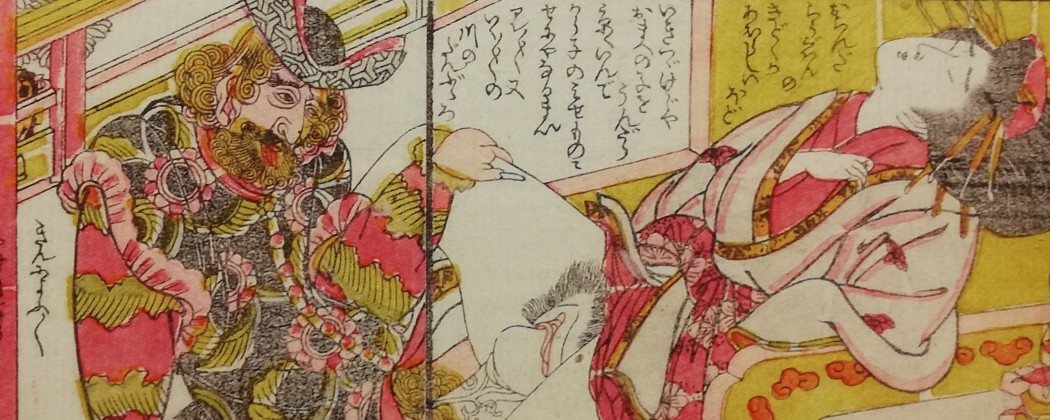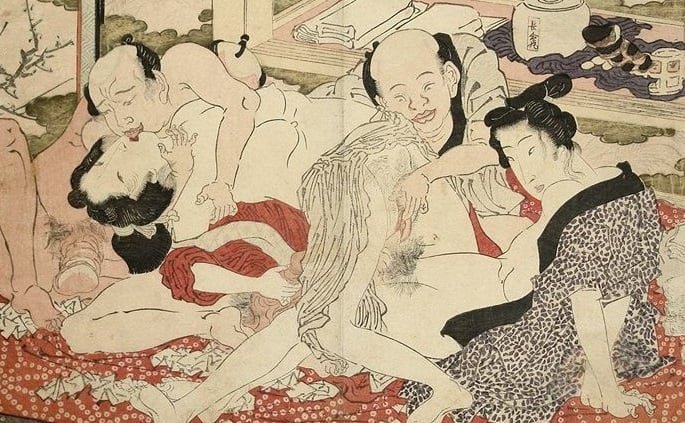
Of all the ukiyo-e artists who designed imagery for the erotic genre of shunga it is by far Ikeda (aka. Keisai) Eisen (1790-1848) who included the most sexual devices to his designs.
Today we explore one of these examples that is from his excellent A Light Spring Snow series:

Fig.1. Title: ‘The Distant Past of the Tenpyõ Era (Tenpyõ hõji no mukashi)‘ (c.1822) from the series: ‘A Light Spring Snow (Haru no usuyuki)‘ by Ikeda Eisen.
Aphrodisiacs
Magnificent depiction of a lascivious woman making love to four males. Most strikingly in this image is the conspicuous display of sexual paraphernalia in the background. These were items that were available at the sex shop Yotsumeya – they specialized in sexual toys, aphrodisiacs, enhancing ointments and various remedies (often billed as exotic foreign imports). Yotsumeya merchandise often appeared in shunga, though rarely so prominently. Yotsumeya had branches in Edo, Osaka and Kyoto.
Below you can discover what some other shunga experts said about this tableau:
Lasciviousness
“…This illustration is linked to the Tenpyõ-Hõji era (757-65). During this turbulent period the same empress would come to power twice, first under the name Kõken and later as Shõtoku (718-70). Her reigns would be interrupted by the short rule of Emperor Junnin (733-65). Following her abdication as Empress Kõken she was strongly influenced by a Buddhist monk named Dõkyõ, a Rasputin-like character who urged her to take up a second reign. Her intense contact with and deep admiration of Dõkyõ gave rise to endless speculation about the nature of their relationship. Despite her reputation as a devout Buddhist she is frequently associated with lasciviousness. Eisen’s striking image seems to reflect the latter metaphorically through the depiction of the figures’ uninhibited sexual behaviour.”

Fig.3. An erotic print depicting a kujiri (upper left), a rin no wa (upper right), a nigozuiki (below left) and below right an azumagata (an imitation vulva). From the series ‘Makura Bunko (The Pillow Library)‘, c.1822/23. By Ikeda Eisen
Penis Cap
“…Remarkable in this composition is the ostentatious display in the background alcove of sex paraphernalia that were known to have been sold by the sex shop Yotsumeya (see Margarita Winkel’s ‘A Flier for the Aphrodisiacal Ointment Chõmeigan‘ (‘long life medicine’), rin no wa (ring with movable beads), harigata (dildo) and yoroigata (‘penis cap’, literally ‘armour form’) – see Fig.3. and 3. The title of the print might suggest that these were age-old devices, and their illlustration in the print might additionally have been intended as a type of ‘product placement’ by the Yotsumeya. Therefore it could be that the Yotsumeya was the sponsor of this work.” (C. Uhlenbeck)

Fig.4. An erotic print depicting a kabutokaki (upper left), a rin no tama (upper right), a dokata (below left) and a ring called namako no wa (below right). From the series ‘Makura Bunko (The Pillow Library)‘, c.1822/23. By Ikeda Eisen
Shocker
“The first shunga plate of Vol. II is perhaps the most shocking of all those in the series: this kind of thing may, indeed, be permissible for macho males — but surely, not for ladies! Anyway, that was the way most people thought in former times, before Women obtained the “Freedom to Fly”; and even in Eisen’s robust era, this print was doubtless intended as something of a shocker.” (R. Lane)
Richard Lane on Eisen’s shunga work:
“…The Ukiyo-e master Keisai Eisen holds a unique position in the Japanese art form of shunga during the early-mid nineteenth century. In the decades following the death of the great Utamaro in 1806, it was principally Eisen who succeeded in continuing and extending Utamaro‘s vision of lovely–but eminently erotic–womanhood. Indeed, without Eisen, the figure prints of this era would mark one of their lowest ebbs in the history of Ukiyo-e.” (R. Lane).
Eisen’s shunga piece is illustrated on p. 170/171 (Ill.61c) in ‘Japanese Erotic Fantasies, Sexual Imagery of the Edo Period‘ by Chris Uhlenbeck and Margarita Winkel and Pl. 8 in Vol.5 of ‘The Complete Ukiyo-e Shunga’ by Richard Lane and Yoshikazu Hayashi.
You can find the PRICE of Ikeda Eisen’s masterwork when you CLICK HERE!
Click HERE for an extensive article on Japanese sex toys used in shunga…!!!

